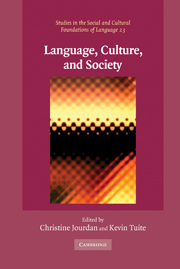Book contents
- Frontmatter
- Contents
- List of tables
- List of contributors
- Acknowledgments
- Introduction: Walking through walls
- 1 An issue about language
- 2 Linguistic relativities
- 3 Benjamin Lee Whorf and the Boasian foundations of contemporary ethnolinguistics
- 4 Cognitive anthropology
- 5 Methodological issues in cross-language color naming
- 6 Pidgins and creoles genesis: an anthropological offering
- 7 Bilingualism
- 8 The impact of language socialization on grammatical development
- 9 Intimate grammars: anthropological and psychoanalytic accounts of language, gender, and desire
- 10 Maximizing ethnopoetics: fine-tuning anthropological experience
- 11 Interpreting language variation and change
- References
- Index
- STUDIES IN THE SOCIAL AND CULTURAL FOUNDATIONS OF LANGUAGE
7 - Bilingualism
Published online by Cambridge University Press: 16 November 2009
- Frontmatter
- Contents
- List of tables
- List of contributors
- Acknowledgments
- Introduction: Walking through walls
- 1 An issue about language
- 2 Linguistic relativities
- 3 Benjamin Lee Whorf and the Boasian foundations of contemporary ethnolinguistics
- 4 Cognitive anthropology
- 5 Methodological issues in cross-language color naming
- 6 Pidgins and creoles genesis: an anthropological offering
- 7 Bilingualism
- 8 The impact of language socialization on grammatical development
- 9 Intimate grammars: anthropological and psychoanalytic accounts of language, gender, and desire
- 10 Maximizing ethnopoetics: fine-tuning anthropological experience
- 11 Interpreting language variation and change
- References
- Index
- STUDIES IN THE SOCIAL AND CULTURAL FOUNDATIONS OF LANGUAGE
Summary
Why worry about bilingualism?
The first question that needs to be asked in a book like this is why this chapter is here at all. How did it come to pass that a concept like “bilingualism” got constituted as an area of enquiry for ethnolinguistics? I will begin here with a consideration of that question as one that is fundamentally about language ideologies, and then go on in the rest of the chapter to explore some of the specific questions that flowed, in my view necessarily, from an understanding of languages as being whole, bounded objects tied to whole bounded social and political units like ethnic groups, nations or states. Bilingualism (a term I will use here to cover multilingualism as well) is an affront to this idea, or at best a puzzle needing to be solved. As a result, academic work on the subject has tended to focus on explorations of the way bilingualism tests our ideas either of language or of social and political categories. One set of questions addresses whether or not bilingualism challenges linguistic theories linked to the idea of language as autonomous and whole; another examines the relationship between bilingualism and the construction of categories like ethnicity, or the nation (or the nation-State), understood as homogeneous and bounded entities, as well as with related categories or concepts, such as community or identity, all of which are central to ethnolinguistic enquiry.
- Type
- Chapter
- Information
- Language, Culture, and SocietyKey Topics in Linguistic Anthropology, pp. 156 - 167Publisher: Cambridge University PressPrint publication year: 2006
- 6
- Cited by

